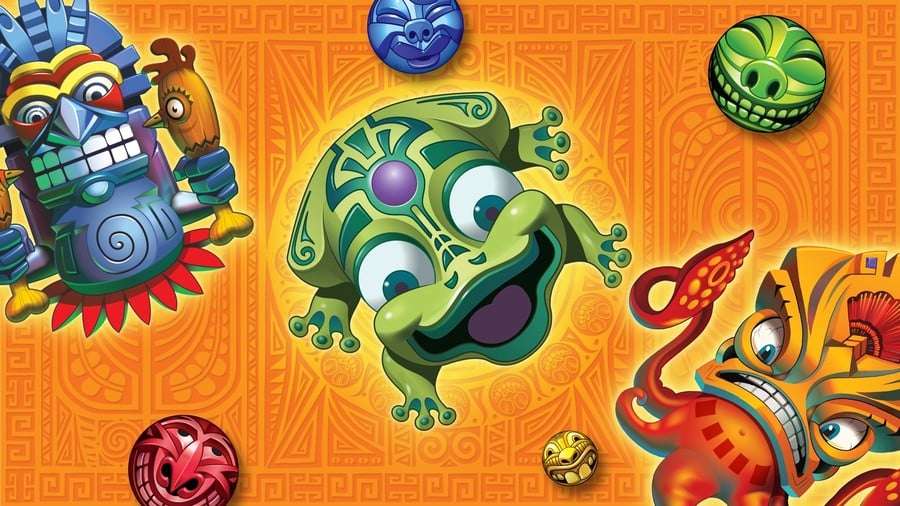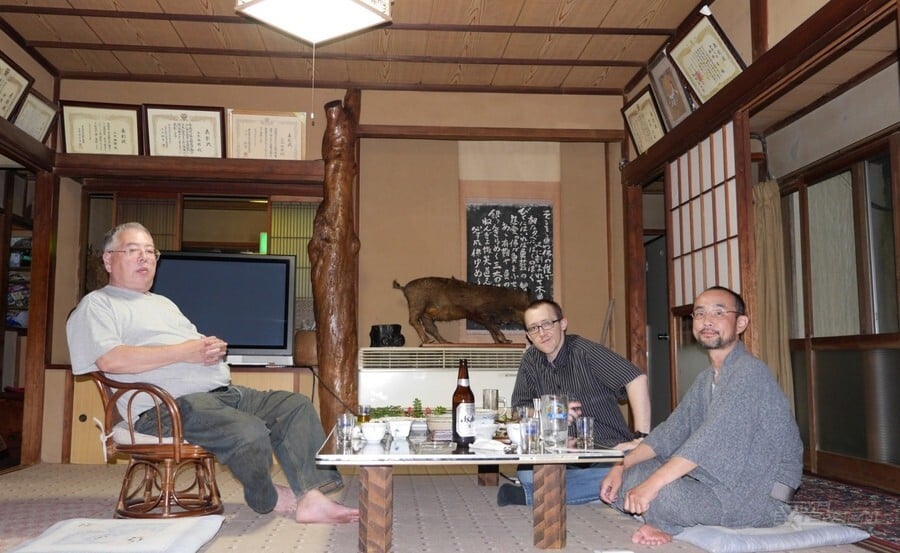
As part of our end-of-year celebrations, we're digging into the archives to pick out some of the best Time Extension content from the past year. You can check out our other republished content here. Enjoy!
"That pisses right on me! You may quote me on that!" says Roy Ozaki forcefully, as we drink warmed sake at a remote Japanese mountain ryokan a few years back.
Ozaki is the head of Mitchell Corporation, and we've been discussing his company's game, Puzz Loop (1998, also known as Ballistic), and how it was shamelessly copied by PopCap Games with Zuma (2003), Mumbo Jumo with Luxor (2005), and (according to Wikipedia) six or more other games by various studios. You've probably played one of them: coloured balls slide into a swirling tube and, using balls that appear in a central cannon, you need to make the balls disappear by matching three of the same colour. It's an ingenious evolution of the formula seen in Taito's Puzzle Bobble (1994).
But let's regress a little. Ozaki makes for a great interviewee since he speaks his mind and holds nothing back. It's a character trait which made him a tough businessman, and Mitchell Corporation – which he inherited from his father – developed an interesting portfolio during its glory days. The final tally for the Ozaki interview was 7 hours of audio, transcribed to over 15,000 words – that should give you some idea of how much ground was covered during our chat almost a decade ago.
The Puzz Loop discussion started with how he takes a hands-off approach to development. "I'm not a gamer; I'm not a creator; I'm not the one who makes it," admits Ozaki. "I just play it – is it fun or not? For Tokyo Crash Mobs, Kouichi Yotsui [Strider] got involved. It's Puzz Loop, people version – it uses real people. All the photography direction was done by Yotsui. This guy's got more talent than me, for sure. <points to Yotsui> I look at it from the business side. I have a feeling for the market. With games like Puzz Loop, if you're in the game business, you know [it's going to do well]. It's very simple, it's the basic logic of a puzzle game."
This simplicity and subsequent success naturally led to other businessmen wanting to copy it. In Puzz Loop's case, the copying started with pirate bootlegs of the arcade original. "I was introduced to a Hong Kong distributor," begins Ozaki, "this guy has a market into China. Which was very big. But I didn't have a market into China. So this guy introduces me at the Japanese show to this Chinese guy. So I sit down and talk, and I've got photographs of Puzz Loop. The guy says, 'I know this game! I sold 10,000.' But I hadn't sold a single board to Hong Kong! It was a copy from Korea. He bought copies from Korea to sell in Hong Kong. We already had a Korean company fitted out. So the guy sold 10,000, whereas I didn't sell one. There were more copies sold than the original. And I can't believe the Americans, with Zuma..."
You can sense the tension in the ryokan as Ozaki says the name 'Zuma'. It's like bitter ashes on the tongue that need washing down with more sake. You cannot deny that Zuma clones Puzz Loop's entire concept. The emotion in Ozaki's voice as he describes events conveys the feeling that while the Hong Kong bootlegs were just about money, the Zuma situation was a personal betrayal by those he trusted. Earlier in the interview, Ozaki had gone to great lengths praising Nintendo of Japan and their respectful way of doing business; Mitchell Corporation had a good relationship with Nintendo Japan, and Ozaki personally liked those he dealt with. Nintendo of America, on the other hand... we probably can't publish all the colourful descriptors.
"I didn't bring it to court. In the end, that's Americans for you," says Ozaki angrily. "If I brought it to court? I have to spend all the money on lawyers in the USA, to bring all those Zuma guys and everybody to court. And you know what? Zuma is out on Nintendo DS. Why? Because PopCap Games was bought by Electronic Arts. So, Electronic Arts brings Zuma on DS to Nintendo USA, and they put it right out. That pisses right on me!"

By now the evening's libations have enlivened the interview nicely. We put it bluntly, as a statement not a question: "So Nintendo screwed you over."
"But Nintendo won't f**k EA, because EA is big," replies Ozaki. "It has games. And I asked [Nintendo USA], 'Why are you doing this to me?' And then I got a reply, but I couldn't post it to people on the Japanese side, because they know it's the same company. I'm pissed off at that! I told them [Nintendo USA], this is morally wrong, what they're doing. So they can screw me, but this is morally wrong. Ethics! You still want me to quote Nietzsche or someone, I can do that. This is business! Anything in life, it concerns ethics! You don't cheat people and then keep making money. That's not fair. I'm pretty pissed off at all this. Especially with the Americans."
The topic drifts onto whether having a bigger publisher behind Puzz Loop could have prevented the cloning – or at least fought the court case on Ozaki's behalf. But Ozaki is adamant that if a bigger publisher had been involved on his side, Mitchell Corporation would have had to relinquish the rights, and again he would have lost out. It's noteworthy that Mitchell Corporation has, over the years, been able to retain the ownership rights to the majority of its portfolio, despite not producing anything since Toyko Crash Mobs (2012), released in the same year that company activity was formally suspended.
Of course, the elephant in the room here is that Mitchell Corporation isn't immune to cloning the ideas of others, either. One of its biggest hits, Pang, is a direct copy of Bubble Buster (1983) by Hudson Soft. However, in Pang's case, it would seem that there was some kind of licensing contract involved – but Ozaki refuses to give details now that Hudson is owned by Konami.

As for what PopCap Games thinks of Puzz Loop and Zuma, company co-founder Jason Kapalka stated in an interview for Digital Arts Management, when asked directly about Puzz Loop: "I've accepted that clones are here to stay. People do take ideas that were there before." And indeed the world continued to take the Puzz Loop idea, reskinning and tweaking it, over and over. Even Mitchell Corporation itself, with its aforementioned Tokyo Crash Mobs. Though in fairness, when you've invented something, you're entitled to reissue it.
Despite these setbacks, there has at least been some recent positive news for Mitchell Corporation. As reported recently, Kouichi Yotsui's excellent Strider spiritual successor Cannon Dancer has recently been licenced by ININ Games for release on home consoles, ending decades of arcade exclusivity. It's been a while since we've had an update to Puzz Loop though; given the timeless perfection of its core concept, it will hopefully resurface again.
The Roy Ozaki quotes included in this feature are taken from an interview that is part of The Untold History of Japanese Game Developers.
Please note that some external links on this page are affiliate links, which means if you click them and make a purchase we may receive a small percentage of the sale. Please read our FTC Disclosure for more information.






Comments 4
Ahh I played Sparkle 2 when it was a PS Plus game. I enjoyed it to some extent but I really liked the music in it which is why I kept playing it
It's just as well. He would not have prevailed in U.S. court anyway, as American copyright law explicitly does not protect the rules and mechanics of a game.
I didn't catch this article the first time around. As someone who actually understands exactly what he's talking about down to the individual game, this is right up my alley and very interesting. You really can't copyright balls, and color matching, especially when you kind of stole it from Taito to begin with.
Zuma IS a blatant ripoff though, no doubt about that. And in particular the DS version of Zuma clearly stole the flicking mechanic. That being said, while magnetica is the best puzzloop, Zumas revenge is a better ds game overall. The boss battles and power ups really do add a completely different feel, even if the aesthetic is kind of dumn and ugly.
Great story!
Bust-A-Move/Puzzle Bobble has also been copied a surprising amount, that I'm not even certain how it got away with.
I'm sure there was even a Spongebob mobile ripoff. (I only know from seeing commercials many years ago when watching Nickelodeon with my niece.) I guess nobody wants to f*** with Viacom, either.
They advertised that and some kind of Rollercoaster Tycoon ripoff as well.
I remember in the mid 2000s Nickelodeon also running some shady commercials telling children to text random numbers to get free jokes from some DreamWorks characters. There's obviously a marketing ploy somewhere (probably to solicit children to get their parents' phone added to the telemarking-okay list). It seems then DreamWorks was owned by Paramount, another Viacom company.
Viacom, you shameful company!
Show Comments
Leave A Comment
Hold on there, you need to login to post a comment...